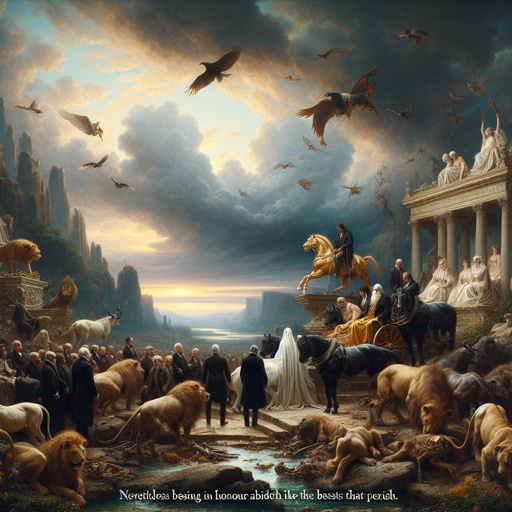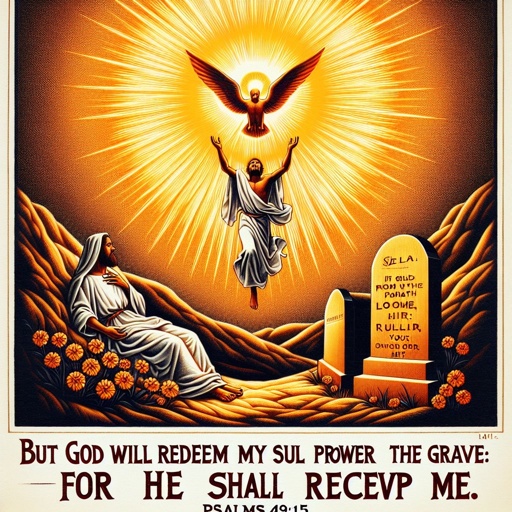What does Psalms 49:1 mean?
"Hear this, all ye people; give ear, all ye inhabitants of the world:" - Psalms 49:1

Psalms 49:1 - "Hear this, all ye people; give ear, all ye inhabitants of the world:"
The verse Psalms 49:1 from the King James Version of the Bible reads, "Hear this, all ye people; give ear, all ye inhabitants of the world:"
This verse is an invitation or a call to attention, addressing all people, regardless of social status or wealth, to listen and pay heed to the words that follow. The psalmist is urging the entire world to listen to the wisdom being imparted in the subsequent verses.
The overarching theme of this verse is the universal nature of the message being conveyed. The Psalmist wishes to convey a message that is applicable to all people, not just a specific group or demographic. This inclusiveness is a recurring theme throughout the book of Psalms, as it emphasizes the idea that the teachings of God are meant for everyone, regardless of their social, economic, or cultural backgrounds.
The context of this verse within the larger passage is a meditation on the fleeting nature of wealth and the universal need for redemption. The psalmist is addressing the futility of placing one's trust in material possessions and the inevitability of death. The Psalmist seeks to convey the message that true wealth lies in one's connection to God and the righteousness of one's actions, not in the accumulation of riches.
The symbolism in this verse lies in the imagery of "Hear this, all ye people; give ear, all ye inhabitants of the world." The use of "hearing" and "giving ear" symbolizes the act of actively listening and paying attention, rather than just passively hearing the words. The term "inhabitants of the world" emphasizes the universal nature of the message, reaching out to all people regardless of their status or background.
Furthermore, the use of the phrase "all ye people" suggests a call to unity and community, recognizing the shared humanity of all individuals, regardless of their differences. This symbolism reinforces the idea that the teachings of God are meant for all people, and that there is a universal bond that unites humanity in their pursuit of spiritual fulfillment.
In addition, the verse sets the stage for the coming message about the transitory nature of material wealth and the importance of focusing on spiritual riches. The psalmist is appealing to a sense of shared experience and common struggle, encouraging all people to reflect on the true value of their lives and the legacy they leave behind.
In conclusion, Psalms 49:1 from the King James Version of the Bible conveys a universal message of wisdom and redemption, inviting all people to listen and pay heed to the words that follow. The theme of inclusiveness, the context of meditating on the fleeting nature of wealth, and the symbolism of unity and actively listening all contribute to the richness and depth of this verse. It serves as a poignant reminder that the true measure of wealth lies not in material possessions, but in one's connection to God and the righteousness of one's actions.
Psalms 49:1 Artwork

Psalms 49:1 - "Hear this, all ye people; give ear, all ye inhabitants of the world:"

Psalms 49:8 - "(For the redemption of their soul is precious, and it ceaseth for ever:)"

Psalms 49:6 - "They that trust in their wealth, and boast themselves in the multitude of their riches;"

Psalms 49:2 - "Both low and high, rich and poor, together."

Psalms 49:20 - "Man that is in honour, and understandeth not, is like the beasts that perish."

Psalms 49:13 - "This their way is their folly: yet their posterity approve their sayings. Selah."

Psalms 49:9 - "That he should still live for ever, and not see corruption."

Psalms 49:12 - "Nevertheless man being in honour abideth not: he is like the beasts that perish."

Psalms 49:3 - "My mouth shall speak of wisdom; and the meditation of my heart shall be of understanding."

Psalms 49:19 - "He shall go to the generation of his fathers; they shall never see light."

Psalms 49:16 - "Be not thou afraid when one is made rich, when the glory of his house is increased;"

Psalms 119:49 - "Remember the word unto thy servant, upon which thou hast caused me to hope."

Psalms 89:49 - "Lord, where are thy former lovingkindnesses, which thou swarest unto David in thy truth?"

Psalms 49:15 - "But God will redeem my soul from the power of the grave: for he shall receive me. Selah."

Psalms 49:4 - "I will incline mine ear to a parable: I will open my dark saying upon the harp."

Psalms 49:10 - "For he seeth that wise men die, likewise the fool and the brutish person perish, and leave their wealth to others."

Psalms 49:7 - "None of them can by any means redeem his brother, nor give to God a ransom for him:"

Psalms 49:5 - "Wherefore should I fear in the days of evil, when the iniquity of my heels shall compass me about?"

Psalms 128:1 - "Blessed is every one that feareth the LORD; that walketh in his ways."

Psalms 49:17 - "For when he dieth he shall carry nothing away: his glory shall not descend after him."

Psalms 78:49 - "He cast upon them the fierceness of his anger, wrath, and indignation, and trouble, by sending evil angels among them."

Psalms 49:11 - "Their inward thought is, that their houses shall continue for ever, and their dwelling places to all generations; they call their lands after their own names."

Psalms 18:49 - "Therefore will I give thanks unto thee, O LORD, among the heathen, and sing praises unto thy name."

Psalms 122:1 - "I was glad when they said unto me, Let us go into the house of the LORD."

Psalms 49:18 - "Though while he lived he blessed his soul: and men will praise thee, when thou doest well to thyself."

Psalms 64:1 - "Hear my voice, O God, in my prayer: preserve my life from fear of the enemy."

Psalms 55:1 - "Give ear to my prayer, O God; and hide not thyself from my supplication."

Psalms 49:14 - "Like sheep they are laid in the grave; death shall feed on them; and the upright shall have dominion over them in the morning; and their beauty shall consume in the grave from their dwelling."

Psalms 9:1-2

Psalms 92:1 - "It is a good thing to give thanks unto the LORD, and to sing praises unto thy name, O most High:"